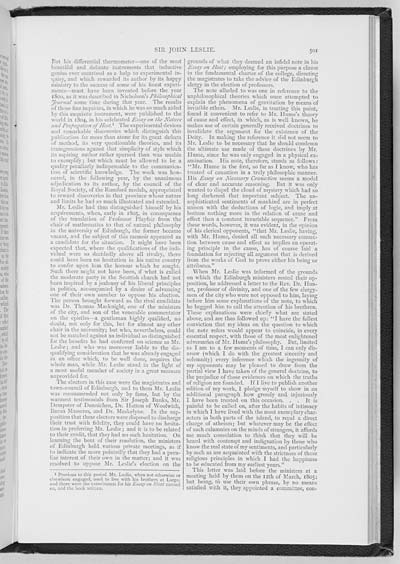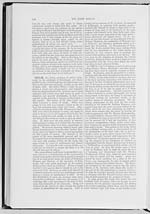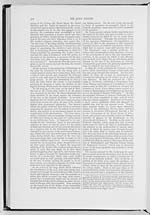501
But his differential thermometer�one of the most
beautiful and delicate instruments that inductive
genius ever contrived as a help to experimental in-
quiry, and which rewarded its author by its happy
ministry to the success of some of his finest experi-
ments�must have been invented before the year
1800, as it was described in Nicholson's Philosophical
Journal some time during that year. The results
of those fine inquiries, in which he was so much aided
by this exquisite instrument, were published to the
world in 1804, in his celebrated Essay on the Nature
and Propagation of Heat.1 The experimental devices
and remarkable discoveries which distinguish this
publication far more than atone for its great defects
of method, its very questionable theories, and its
transgressions against that simplicity of style which
its aspiring author rather spurned than was unable
to exemplify; but which must be allowed to be a
quality peculiarly indispensable to the communica-
tion of scientific knowledge. The work was hon-
oured, in the following year, by the unanimous
adjudication to its author, by the council of the
Royal Society, of the Rumford medals, appropriated
to reward discoveries in that province whose nature
and limits he had so much illustrated and extended.
Mr. Leslie had thus distinguished himself by his
acquirements, when, early in 1805, in consequence
of the translation of Professor Playfair from the
chair of mathematics to that of natural philosophy
in the university of Edinburgh, the former became
vacant, and the subject of this memoir appeared as
a candidate for the situation. It might have been
expected that, where the qualifications of the indi-
vidual were so decidedly above all rivalry, there
could have been no hesitation in his native country
to confer upon him the honour which he sought.
Such there might not have been, if what is called
the moderate party in the Scottish church had not
been inspired by a jealousy of his liberal principles
in politics, accompanied by a desire of advancing
one of their own number to oppose his election.
The person brought forward as the rival candidate
was Dr. Thomas Macknight, one of the ministers
of the city, and son of the venerable commentator
on the epistles�a gentleman highly qualified, no
doubt, not only for this, but for almost any other
chair in the university; but who, nevertheless, could
not be matched against an individual so distinguished
for the benefits he had conferred on science as Mr.
Leslie; and who was moreover liable to the dis-
qualifying consideration that he was already engaged
in an office which, to be well done, requires the
whole man, while Mr. Leslie stood in the light of
a most useful member of society in a great measure
unprovided for.
The electors in this case were the magistrates and
town-council of Edinburgh, and to them Mr. Leslie
was recommended not only by fame, but by the
warmest testimonials from Sir Joseph Banks, Mr.
Dempster of Dunnichen, Dr. Hutton of Woolwich,
Baron Masseres, and Dr. Maskelyne. In the sup-
position that these electors were disposed to discharge
their trust with fidelity, they could have no hesita-
tion in preferring Mr. Leslie; and it is to be related
to their credit, that they had no such hesitation. On
learning the bent of their resolution, the ministers
of Edinburgh held- various private meetings, as if
to indicate the more pointedly that they had a pecu-
liar interest of their own in the matter; and it was
resolved to oppose Mr. Leslie's election on the
1 Previous to this period Mr. Leslie, when not otherwise or
elsewhere engaged, used to live with his brothers at Largo;
and there were the experiments for his Essay on Heat carried
on, and the book written.
grounds of what they deemed an infidel note in his
Essay on Heat; employing for this purpose a clause
in the fundamental charter of the college, directing
the magistrates to take the advice of the Edinburgh
clergy in the election of professors.
The note alluded to was one in reference to the
unphilosophical theories which once attempted to
explain the phenomena of gravitation by means of
invisible ethers. Mr. Leslie, in treating this point,
found it convenient to refer to Mr. Hume's theory
of cause and effect, in which, as is well known, he
makes use of certain generally received doctrines to
invalidate the argument for the existence of the
Deity. In making the reference it did not seem to
Mr. Leslie to be necessary that he should condemn
the ultimate use made of these doctrines by Mr.
Hume, since he was only engaged in a physical ex-
amination. His note, therefore, stands as follows:
'' Mr. Hume is the first, so far as I know, who has
treated of causation in a truly philosophic manner.
His Essay on Necessary Connection seems a model
of clear and accurate reasoning. But it was only
wanted to dispel the cloud of mystery which had so
long darkened that important subject. The un-
sophisticated sentiments of mankind are in perfect
unison with the deductions of logic, and imply at
bottom nothing more in the relation of cause and
effect than a constant invariable sequence." From
these words, however, it was evident, in the opinion
of his clerical opponents, "that Mr. Leslie, having,
with Mr. Hume, denied all such necessary connec-
tion between cause and effect as implies an operat-
ing principle in the cause, has of course laid a
foundation for rejecting all argument that is derived
from the works of God to prove either his being or
attributes."
When Mr. Leslie was informed of the grounds
on which the Edinburgh ministers rested their op-
position, he addressed a letter to the Rev. Dr. Hun-
ter, professor of divinity, and one of the few clergy-
men of the city who were not opposed to him, laying
before him some explanations of the note, to which
he begged him to call the attention of his brethren.
These explanations were chiefly what are stated
above, and are thus followed up: "I have the fullest
conviction that my ideas on the question to which
the note refers would appear to coincide, in every
essential respect, with those of the most enlightened
adversaries of Mr. Hume's philosophy. But, limited
as I am to a few moments of time, I can only dis-
avow (which I do with the greatest sincerity and
solemnity) every inference which the ingenuity of
my opponents may be pleased to draw from the
partial view I have taken of the general doctrine, to
the prejudice of those evidences on which the truths
of religion are founded. If I live to publish another
edition of my work, I pledge myself to show in an
additional paragraph how grossly and injuriously
I have been treated on this occasion. . . It is
painful to be called on, after the habits of intimacy
in which I have lived with the most exemplary char-
acters in both parts of the island, to repel a direct
charge of atheism; but whatever may be the effect
of such calumnies on the minds of strangers, it affords
me much consolation to think that they will be
heard with contempt and indignation by those who
know the real state of my sentiments, and particularly
by such as are acquainted with the strictness of those
religious principles in which I had the happiness
to be educated from my earliest years."
This letter was laid before the ministers at a
meeting held by them on the 12th of March, 1805;
but being, to use their own phrase, by no means
satisfied with it, they appointed a committee, con-

![]() Universal Viewer |
Universal Viewer | ![]() Mirador |
Large image | Transcription
Mirador |
Large image | Transcription
![]()

